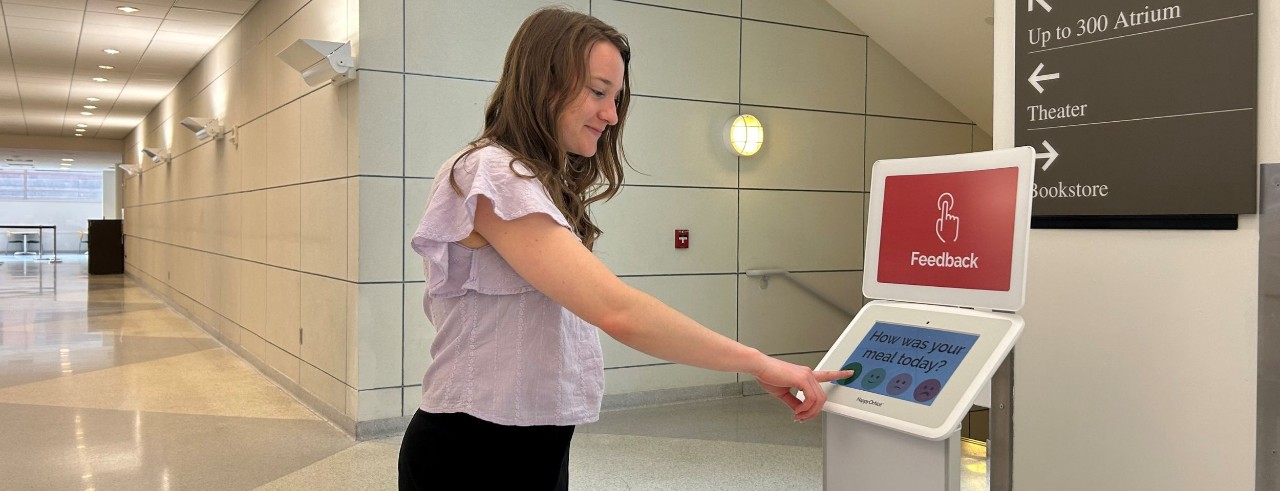
HappyOrNot kiosks added to enhance campus experience
Kiosks track customer satisfaction in real time
The University of Cincinnati is committed to ensuring that its students, faculty and staff have a positive and fulfilling experience while on campus.
One way the university is accomplishing this is by deploying HappyOrNot kiosks across the Uptown campus. These kiosks serve as a tool to track customer satisfaction levels in real time and enable Campus Services to make data-driven decisions to enhance service quality, customer loyalty and employee engagement.
Currently, there are 26 HappyOrNot kiosks located in various areas across the Uptown campus, making it easy for individuals to provide feedback about their experience with Campus Services. These kiosks are aligned with the Next Lives Here innovation agenda, which aims to provide analytical solutions in areas of opportunity. The widespread deployment of the HappyOrNot kiosks demonstrates the university's commitment to enhancing the overall experience for its community members.
The feedback collected from the kiosks is processed and analyzed through an online reporting dashboard. This dashboard provides detailed insights into customer or employee satisfaction levels, trends and patterns. The university can use this information to identify areas for improvement and make data-driven decisions to enhance service quality, customer loyalty and employee engagement. For example, if there is a consistent complaint about the quality of food in a particular dining facility, Campus Services can use this feedback to make the necessary changes to improve the quality of the food.
Encouraging students, faculty and staff to engage with the HappyOrNot kiosks and provide feedback is crucial in enhancing the customer experience. The university understands that the feedback collected through these kiosks provides a direct channel for individuals to voice their opinions, suggestions and concerns. By leveraging the feedback collected through the kiosks, we can create an environment that prioritizes the needs and preferences of its community, ultimately fostering a positive and fulfilling campus experience.
Related Stories
Achala Vagal, MD, appointed chair of Department of Radiology at UC College of Medicine
July 11, 2025
The UC College of Medicine announces Achala Vagal, MD, as chair of radiology. A national leader in neuroradiology and stroke imaging, Vagal has 20-plus years of experience, advancing research, AI integration, mentorship and patient-centered innovation.
Understanding resistance to targeted therapies in head and neck, breast cancer
July 11, 2025
MSN highlighted University of Cincinnati Cancer Center and Cincinnati Veterans Affairs Medical Center research published in the journal Oncotarget that reviewed current research on why Epidermal Growth Factor Receptor-targeted therapies often fail in breast and head and neck cancers.
What parvovirus is and why it's on the rise
July 10, 2025
An infectious virus common in children is on the rise in the Tristate. The Cincinnati Health Department is warning of a rise in parvovirus in Hamilton County. The illness can present itself as a rash on the cheeks and is often called “slapped cheek” disease but can present more serious concerns in pregnant women. Kara Markham, MD, professor of obstetrics and gynecology at the University of Cincinnati College of Medicine recently appeared on Cincinnati Edition on WVXU to discuss how parvovirus is transmitted, the risk of serious cases and how to prevent it.
UC joins international Phase 1 trial testing CAR-T therapy for MS
July 10, 2025
The University of Cincinnati Gardner Neuroscience Institute is a trial site for a multicenter, international Phase 1 trial testing CAR-T cell therapy for patients with multiple sclerosis.
Inflammation, not symptoms, found to disrupt sleep in IBD patients
July 9, 2025
Impaired sleep architecture in inflammatory bowel disease (IBD) is primarily driven by inflammatory activity rather than symptomatic flares as previously thought, according to a study published in Clinical Gastroenterology and Hepatology. Sleep architecture is the structural organization of a normal sleep cycle, encompassing the progression and distribution of different stages of sleep throughout a typical night’s rest.
Study traces evolutionary origins of an important enzyme complex
July 9, 2025
MSN highlighted University of Cincinnati Cancer Center research published in Nature Communications that traced the evolutionary origins of the PRPS enzyme complex and learned more about how this complex functions and influences cellular biochemistry.
Hoxworth employees help pen latest edition of textbook widely used in field of apheresis technology
July 8, 2025
Hoxworth Blood Center, University of Cincinnati, is proud to share that four apheresis employees are now published authors. Caroline Alquist, MD, Krystol Weidner, Kelly Anstead and Jamie Swafford helped write Principles of Apheresis Technology, Eighth Edition.
Veterans urge mindfulness with fireworks
July 8, 2025
Spectrum News 1 and WCPO coverage of UC Veterans Programs & Services in conjunction with Independence Day. Interviews with UC's program director Terence Harrison and veteran-student Crystal Merino.
What might be going on if rest makes your back pain worse
July 8, 2025
The University of Cincinnati Gardner Neuroscience Institute's Joseph Cheng was featured in a SELF article discussing situations and strategies when rest appears to be making back pain worse.
Study traces evolutionary origins of important enzyme complex
July 8, 2025
New University of Cincinnati Cancer Center research published in the journal Nature Communications traced the evolutionary origins of the PRPS enzyme complex and learned more about how this complex functions and influences cellular biochemistry.
